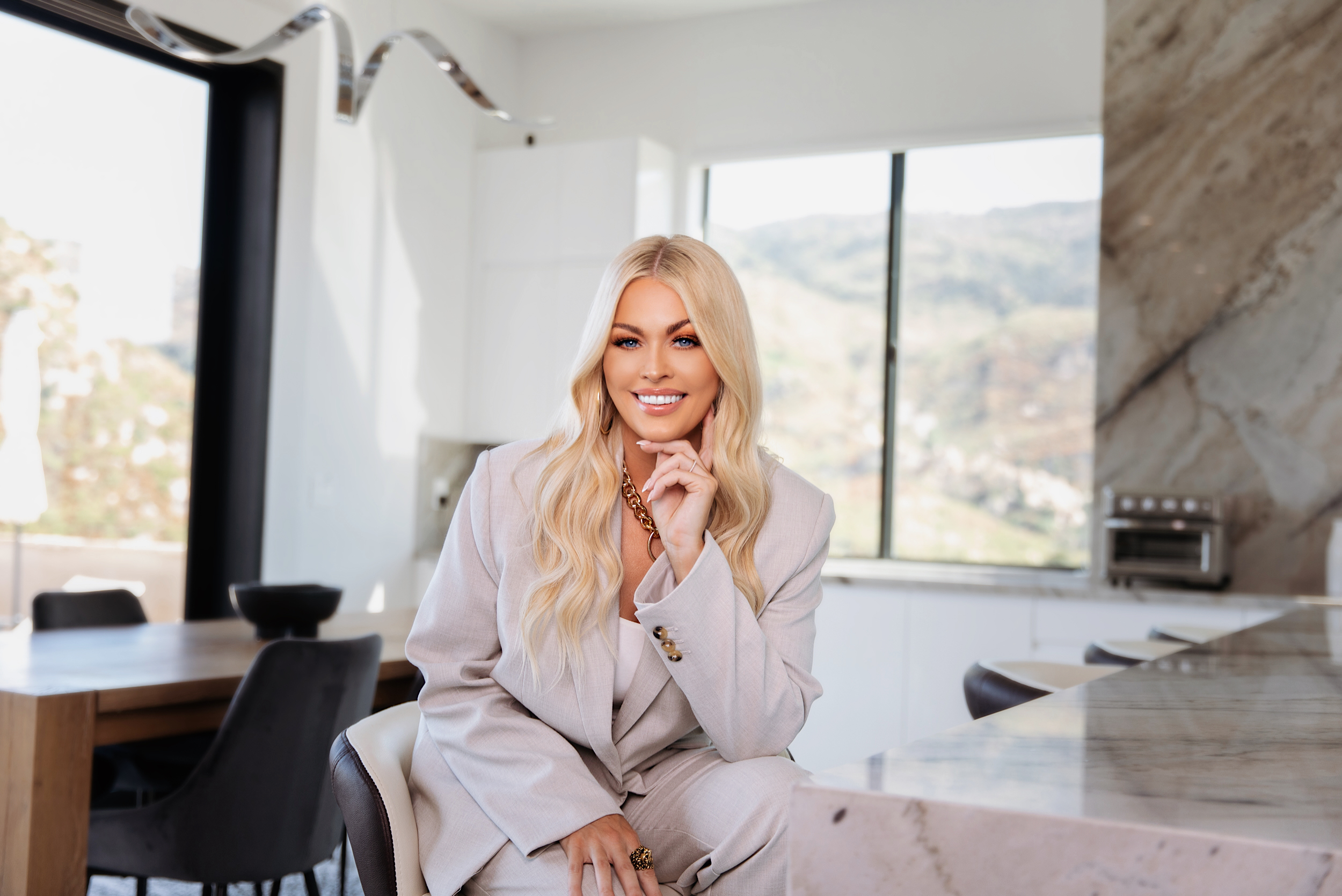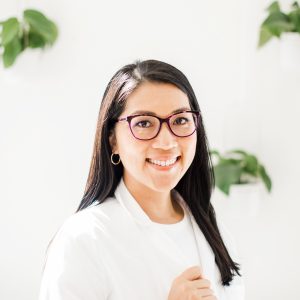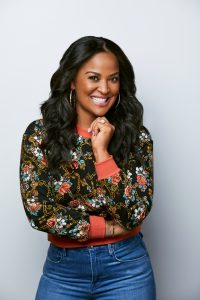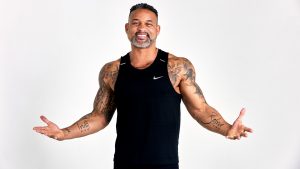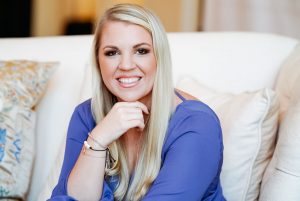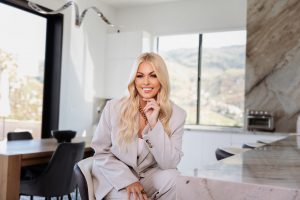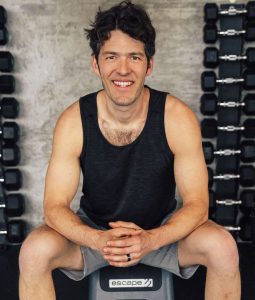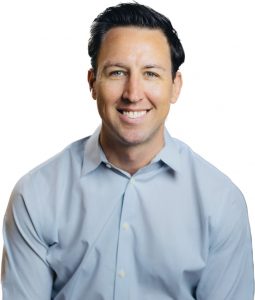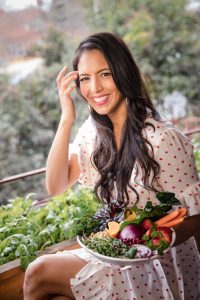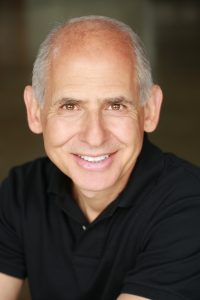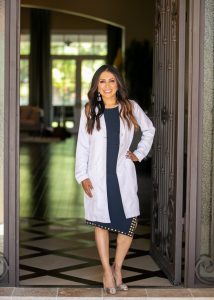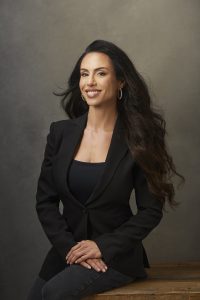SHAWN STEVENSON: Welcome to the 2023 Family Health and Fitness Summit. We’ve got a very, very special interview today. We’ve got somebody who is personally somebody that I sit down and eat a lot of meals with as families collectively. And she’s the founder of the Institute of Transformational Nutrition and Modern Life Coach School. Cynthia Garcia, welcome to the 2023 Family Health and Fitness Summit.
CYNTHIA GARCIA: Hi.
SHAWN STEVENSON: What it do?
CYNTHIA GARCIA: [chuckle] I am so happy to be here. You have no idea. This is probably… So we’ve sat down to chat a few times before on your show. This is my favorite. I gotta tell you. It’s true because you know me, and like you said, yeah, our families play together, work together, eat together, more importantly. And it just is so special. One of my core values is family.
SHAWN STEVENSON: Yeah.
CYNTHIA GARCIA: It’s everything. So I love the cookbook. I love that you’re putting this together to help folks. And yeah, so this, I’m super excited about.
SHAWN STEVENSON: Thank you. Thank you. And the thing is, also, I know that you’re really about that life when it comes to your family and wellness. But if you could, can you share why is family health and wellness so important to you?
CYNTHIA GARCIA: That’s a great question. For a multitude of reasons, starting with the way I grew up. So we grew up kinda similar. We may share a mother, I don’t know yet. [laughter] I think our mother kinda spawned into two. [laughter]
SHAWN STEVENSON: We’ve never seen them in the same place at the same time before.
CYNTHIA GARCIA: We had not. You just got the skin a little darker. But no, it was interesting growing up. I’ve heard you talk about your upbringing many times and we didn’t have a lot of food. We didn’t have a lot of money to buy food. We relied on a lot of government assistance, food stamps, government cheese, which I know you write about in the book. If you’ve never had government cheese before, it’s a little different. So it was tough getting good healthy food growing up and just getting any food growing up. And then when I got older and I moved to Los Angeles, I’d also gone through a pretty traumatic childhood and upbringing, and so dealt with a lot of adversity there. And so when I came to Los Angeles, I was trying to really escape the way I grew up.
CYNTHIA GARCIA: And so I got out of here and I started learning some things about some things. I started making some money and I started eating everything [chuckle] because I didn’t have that luxury before. And I fell into some unfortunate situations. I was eating really shitty food, had horrible relationships, ended up getting really sick. Had my own health journey. I was diagnosed with chronic fatigue. My hair was breaking and falling out. I gained, I was 25 pounds overweight. Like all of these crazy things started happening. I couldn’t work. I was so sick and got to the point where I thought suicide was the only way out. I just could not live that way. I thought, why is just my whole life been like this? And through a lot of research and studying and just initiative, turned things around and created a model for other people to help other people. But then the real kicker came when I gave birth to my daughter, Rane. Shawn, I remember seeing this little tiny baby in this crib and realizing that somehow my heart had come out of my body and was just laying there.
CYNTHIA GARCIA: And I’m kind of a nerd. And I’d gone through my own health journey and was at the point where I was coaching other people on their health. And so I was reading studies while she slept ’cause again, big nerd, kinda like you, would like studies. And so I was reading this study that said… It said, for the first time ever, we’re raising a generation of children that may not outlive their parents. And I saw my heart laying in this crib. I still get emotional over this. And I thought, no, nah, absolutely not. And so it was shortly after that that I founded ITN, the Institute of Transformational Nutrition because I thought we’ve gotta do better. We’ve gotta do better for ourselves, we’ve gotta do better for our families, for our children, for this next generation. They deserve that. And so it’s kind of a long history from all the way from my childhood to my daughter’s childhood. So it’s a very long answer to your question, but that’s why I’m so passionate about this work. Yeah.
SHAWN STEVENSON: That was so, so powerful. And certain elements of this like I can’t even… I can’t imagine you not being healthy.
CYNTHIA GARCIA: Yeah. Yeah.
SHAWN STEVENSON: And also this is part of our story and to also know the catalyst behind this because truly, you got something bigger than a lot of people get, like this kinda download that I can’t do this by myself.
CYNTHIA GARCIA: No way. Yeah.
SHAWN STEVENSON: And so really advocating and creating an army of wellness warriors essentially, and really creating, and this is why transformation is in the name itself, really creating this model for that. And it’s so special. And also being able to through it all, find a way to grow your own healthy new culture that you’ve created essentially.
CYNTHIA GARCIA: Yeah.
SHAWN STEVENSON: And that’s really what I wanna direct things too, is to talk about how you’ve gone about this because coming from where you come from and being able to basically you have a clean slate in front of you now in this crib. What are some of the things that you did kinda proactively to create a family culture of wellness? To create a culture of connection?
CYNTHIA GARCIA: Yeah. Well, I think that’s what I did. I tried to create a culture of health and wellness in my family. I was very intentional about how I did this. And I’m sure I know you were as well, but one of the things that I did from the time Rane was a little tiny thing, was I would educate her on food. I would take her to a garden and I would teach her the smell of different herbs, and then we would use those herbs in food. And she got to be a part of that. I’ve cooked with her since she couldn’t even walk. And I would sit her on the counter and cook. And then when she got a little bit older and I wanted to start teaching her about nutrition, I remember I would feed her broccoli, and broccoli looks like little trees, looks like little baby trees.
CYNTHIA GARCIA: And so I knew that in order to educate her, I had to talk to her in a way that she could understand it. And so I would say these are little baby trees and they’re really good for you. This is just a little baby tree, but look at that big tree. If you wanna grow big like that big tree, you eat the little trees. Now, of course she knew it wasn’t really a little tree, she knew it was broccoli. But you have to phrase things in a way that makes sense to them on their level. So from a very young age, we’ve cooked together, we’ve gardened together. We shop together.
CYNTHIA GARCIA: And I think that’s where it starts, is in your own home. That being said, it’s not the only place it can start. If you’ve not done that with your kids, you could start doing it at any time. Like at any time, we can just choose to do something different. And there’s lots of ways you can do that. But I think developing those habits from a really young age, she doesn’t know anything any different. Do you know what I mean? So she doesn’t know fast food ’cause she’s never had that. I had to unlearn all of these things. I had to break these toxic patterns. I had the chemicals that were poisoning my brain, and that’s all I was craving was fast food or Taco Bell or whatever. And luckily, she didn’t because it’s just how she was raised essentially.
SHAWN STEVENSON: As soon as you said Taco Bell, I heard that bell.
CYNTHIA GARCIA: The commercial man was the worst. [laughter] Do You remember we… I was talking about this the other day with Zach, my husband Zach. Do you remember those boxes?
SHAWN STEVENSON: Of course. 10 pack. You get the six pack or the 10 pack. Guess what?
CYNTHIA GARCIA:You can do hard shell or soft shell.
SHAWN STEVENSON: Guess what? I ate a 10 pack. [laughter] Yeah. Yeah. It’s true.
CYNTHIA GARCIA: By yourself?
SHAWN STEVENSON: Yes, by myself.
CYNTHIA GARCIA: I love that. I Love it.
SHAWN STEVENSON: Yeah. It is a bit of a problem, to be honest, but yeah, absolutely, I remember that. As soon as… Again, that’s the power of food, it’s tied to these memories.
CYNTHIA GARCIA: It is. Yeah.
SHAWN STEVENSON: And so it’s like one of your tips right off the bat is being intentional.
CYNTHIA GARCIA: Yeah.
SHAWN STEVENSON: Being intentional.
CYNTHIA GARCIA: Yeah.
SHAWN STEVENSON: Because understanding how food is so deeply tied to memory, now we can intentionally create this kind of atmosphere of wellness in relationship to food. And I also love you talking about education by participation with your kid and getting them involved in that process, being able to like see a little bit more of where their food comes from, to smell the smells, to have this kind of deeper level of interaction. And also this really powerful tip that a lot of parents do, but sometimes we do the opposite, which is to speak their language.
CYNTHIA GARCIA: Yeah.
SHAWN STEVENSON: Speak their language.
CYNTHIA GARCIA: Yeah.
SHAWN STEVENSON: That goes so far because communication is fundamental in connection. I remember… When you shared that, I was like, oh, I remember the threats. I was like, eat it all or eat it or you’re gonna sit there like that was kind of the atmosphere. And sometimes again, it’s not that it’s like our parent is necessarily trying to be mean or a bad parent, it’s just like they want you to eat the food so that you can survive. But also, of course, that doesn’t mean that it’s right and that doesn’t mean that things could have been done differently. But it’s just also for me to take that perspective and like, okay, this is what I’m gonna do instead. And so framing it in a way like the little trees and just being able to get to the level of language level of your child, and when you shared that, this is the huge revelation was that’s how we learn. We learn connecting things that we already know to things that we don’t know. Like they don’t know this food potentially. Connecting it to something that they do know is like that’s the bridge for learning.
CYNTHIA GARCIA: Yeah. And remembering that you set the example, if it’s important to you, it’s important to them. If it’s how you be, it’s how they be. Because they parrot, our children parrot us. And a lot of people do in our lives. People see you as the model of health and they think, I want that too. And so then they follow you and they see what you’re doing and they learn through you. Our children are doing that from the time they’re born. There’s no more important role model, there’s no one important, more important than their parents to see this from. And I think that that’s just really important. One of my favorite humans on the planet [chuckle] is a guy named Ron Finley. Do you follow his work? Do you know his work?
SHAWN STEVENSON: Is that the urban gardener?
CYNTHIA GARCIA: Yeah, the gangster gardener. And he’s just an amazing human being and he tells it like it is, which you know I like. But he talks a lot about children and how you get kids to eat healthy. ‘Cause a lot of times parents will say, well, my kids won’t eat that. And he says, it’s because your kids don’t know this. They don’t have any experience with this. Why would they eat it? But he says this really important thing, and for people who don’t know, Ron Finley is this guy who lives in South Los Angeles and woke up one morning, wanted a tomato, had to drive 45 minutes to a store to find a tomato. And when he got there, there was a sign on the tomato. You can listen to interviews with him that said, the tomato is covered in shellac, which is what you cover furniture with, like wood. And he was just like, something, somebody has to do something. And so he noticed as he went home that we have these things, most cities do, that you have a sidewalk. You have a little patch of land, and then the sidewalk and then the yard. And he started noticing that there was just dirt there. And he thought, I’m gonna plant gardens because obviously South Los Angeles is a food desert, much like Chicago, Detroit, Atlanta…
SHAWN STEVENSON: Ferguson.
CYNTHIA GARCIA: A lot of major cities have them. And there’s just not healthy food available. So he decided he would plant gardens here ’cause he thought that’d be great for his community. [chuckle] And unfortunately, the city of Los Angeles didn’t agree. The city of Los Angeles put out a warrant for his arrest. I am not playing with you. And he was just like, what the fuck? So long story short, he ended up getting that law reversed. And now it’s completely okay to plant gardens in those little areas because technically you own it, but the city regulates it. So now it’s completely okay to do that. And he has completely transformed his community, his neighborhood, the way they eat. And again, if kids grow kale, kids eat kale. That’s what he says. So I think it’s just being that example and bringing kids along for the journey and educating them. They’re naturally curious. They want to learn. They want to understand why you eat that thing. What is that thing? Where does it come… What does it taste like? Like they’re naturally curious. And so involving them in that process is really critical. Whether that’s from birth or 10, 12, whatever the age is, 30, it doesn’t matter.
SHAWN STEVENSON: Yeah. We’re just big adult babies really.
CYNTHIA GARCIA: We really are. We really Are.
SHAWN STEVENSON: And like you just said, and that’s so, so empowering for us to remember too. Wherever your kids are on that age spectrum, there is still so much opportunity because cravings are cultural.
CYNTHIA GARCIA: Yeah. Yeah. Yeah.
SHAWN STEVENSON: It’s The things that we’re getting exposed to and being able to introduce things that… I’ve had this experience so many times where somebody, they’ve haven’t had whatever, fill in the blank before and then they have it with me and it’s like, it transforms them. Like they… Oh, I’m eating that forever. I’m thinking about he’s pretty popular guy out there, Lewis Howes. He had never eaten guacamole before and he just had this thing…
CYNTHIA GARCIA: Stop Talking.
SHAWN STEVENSON: Yeah. And he’s big, like, he loves salsa dancing.
CYNTHIA GARCIA: There’s no way that’s true.
SHAWN STEVENSON: He’s a big guy. He’s out here in the salsa clubs and in like Bangladesh or wherever, like some random exotic place. He’ll be in the salsa club, but he’s never had what goes next to the salsa, the guacamole. And so he’s like, I tried it before, but it’s just like, I just don’t like it. I made him some of the su… Actually the superfood guacamole and the Eat Smarter Family Cookbook. True story. [laughter] Made it for him. And he got to going and he finished it.
CYNTHIA GARCIA: What?
SHAWN STEVENSON: And so now he’s a guacamole fan.
CYNTHIA GARCIA: That’s so cool.
SHAWN STEVENSON: It’s the exposure, it’s the environment, it’s the connective tissue. There’s so many elements. There is a way. And also of course, it’s paying attention to people’s preferences. But I know Louis grew up like we did and he’s just like, been about that Pop-Tart life for many years, you know what I mean? And so like he had to train and introduce new things to his pilot along the way. And just finding a bridge to opening that up, that’s really half the battle as GI Joe would say. So are there any other things that you’ve done because you led this off what? And being intentional is like that first domino, like I was… Just that part. If you could even speak to that because I think a lot of parents, we question so much of what we do because we wanna do it right.
CYNTHIA GARCIA: Yeah.
SHAWN STEVENSON: And just the fact that somebody’s wanting to do good or to be a good parent or to create a healthy culture, let’s speak to that. Just the fact that we’re even asking that question speaks to the quality of parent that you are.
CYNTHIA GARCIA: Yeah. Absolutely it does. And listen, as a parent, I definitely don’t get it right all the time. [chuckle] You might, I do not. I have the best intentions, but I don’t know that any parent really knows what they’re doing. I think most of us are just making it up as we go and hoping it turns out alright. Essentially what we’re all trying to do is just take the information that we have, the best information that we have in that moment and make the best decision that we can for our children. And I look back with Rane and there are things that I’m like, I can’t believe I did that, but at the time, I thought it was the right thing to do. So I think it all starts again with the intention and then you let that guide you.
CYNTHIA GARCIA: The other thing that I think is important to remember is as parents, when your child cries, you don’t just hear them, you feel them. You feel that cry. You’re just like, make the baby stop. I gotta hit my baby. That’s so true in everything. Like that intuition as a parent, I think is often overlooked because we go to so-called experts and we listen to their advice on you name it, I won’t get into all the topics, but you already know. And unfortunately, we listen to that. I remember one incident in my life and I thought, if you let my daughter be okay through this, I will never doubt my own inner knowing about what’s best for my child ever again. And I haven’t since that day. And so I think that’s the other part, is just really connecting to you know your child.
CYNTHIA GARCIA: You know your child better than than anyone. And connecting to them, talking to them in a way that they can understand it. Creating a culture where they’re a part of it. Like mealtimes at my house or a family activity. We do a lot of really fun things around food, Rane gets involved, she helps us meal plan, she has a say so in what we eat, how we eat, she sets the table. We make dinner an experience, and then we have fun with it. Every Friday, as you know is pizza and a movie night. So we make this really healthy pizza and we make it from scratch and it’s a whole thing and it’s great. And we spend that time connecting as a family, which is something else I really want to speak to because what I know and believe about nutrition is it’s not just the food that you put in your mouth.
CYNTHIA GARCIA: Health isn’t just eating healthy food and working out, even though those things were important. Like let’s not misspeak, but there’s other pillars involved as well. And this is really… This was part of my own health journey and this is the model of transformation or nutrition. So yes, there’s physical health, sleeping well, eating smarter. All of those great things, supplements, water, all the things that you already know, movement. But then there’s also mental nutrition. So what are you feeding yourself mentally? Transformational nutrition is the study of health on multiple levels. The three pillars are physical nutrition, mental nutrition, and spiritual nutrition. It’s the study of what feeds us as human beings. We’re not computers, it’s not calories in and calories out. I wish it were that simple. We’re very complex. And so we have to look at what are we feeding ourselves mentally?
CYNTHIA GARCIA: What are our children’s emotions? What are the stories they’re telling themselves? What are they feeding themselves from screens every day? What is coming into their mental environment? And then spirituality is all about connection. So relationships that they form and relationships with themselves most importantly, relationships with other people, their friends, their community, maybe their church, if they attend one, the connection with the planet and where their food comes from in the first place. These are all ways that we are fed. And so I would be remiss to not talk about those other two pillars because my experience now, what, 18 years of doing this work? Crazy. Shows that, yes, the physical pillar is important, but often times the mental nutrition, the spiritual nutrition is just as important, if not more so. And they all three impact each other. It’s like a three-legged stool. If one of them is shorter or missing, get a little wobbly, you might just fall over. No one wants that. So I think that’s the other part. And that’s where you can start the education process. That’s where you can create these rituals like pizza and a movie night. One of the things that we always do at dinner is gratitude. So we have this little token that we pass around and it’s kinda like a talking stick. Do ever talking stick?
CYNTHIA GARCIA: Yeah. So whoever has a talking stick gets to talk, and everybody else listens and respects. And so we just go around the table and we say what we’re grateful for. And so gratitude, as you know, there’s so many studies around gratitude that just shows like it’s a way of being fed, it’s a way of just… It’s a mental exercise. It’s very spiritual. And it’s a great time for us to connect as a family, and that’s part of the culture going back to where we started. Is you create this culture around food and family and connection. So another ritual that we do sometimes at dinner, and sometimes we have talk night Tuesdays. We do this at talk night Tuesdays, we have talk night Tuesdays every week, which is where we connect as a family. And we just talk about what’s going on in our lives. But sometimes at dinner, we’ll do this thing called Rose, Bud, Thorn. Do you know this exercise?
SHAWN STEVENSON: No. I’m curious.
CYNTHIA GARCIA: Super fun. Okay. So Rose is you talk about something that’s really blooming in your life. So what’s really going well? What’s great? A bud is something that you’re just sort of working on, you’re just playing around the edges with it. It’s something new that you’re trying. Could be a new food, could be a new experience, could be a new friend, could be a new thought or idea that you’ve had, a new hobby. And then a thorn is what’s poking you right now. Like, what are you having a hard time with? And we just share. No one problem solves. No one care takes, it’s just everyone’s opportunity to connect and to share on that communal level. So what we really do is make dinner, make our meals an experience. And you’ll appreciate this ’cause I know you’re a science nerd like I am. But studies show that when you make your meals an experience, so you set the table, you don’t use the paper plates, you use real ones. And you light some candles maybe, you turn on some music. We listen to music while we eat, I know you guys do as well. And you make it an experience where you’re connecting. Studies show you eat less, but you’re more satisfied when you’re finished. Ain’t that amazing? And you’re not hungry.
SHAWN STEVENSON: Yeah.
CYNTHIA GARCIA: Because you’ve been fed, you’ve been fed physically, mentally, and spiritually. So you’ve got the whole package. So yeah, there’s so many things. I could go on and on about just ideas and how you turn this into a lifestyle and a culture that you’re building for your family. And the great thing is your children pass it on to their children. We talk so much about changing the world. I wanna change the world. I wanna change the world. And we have these big old ideas. We have AI and we have Neuralink, and nothing’s wrong with that, that’s a beautiful thing. But when you change who you be… We can talk about the difference in being and doing if you want. When you change who you be, and that’s how your children be as a byproduct, then their children will be too. Like I had to change, so did you, because we grew up in very different circumstances. We grew up with a culture that wasn’t about that healthy lifestyle and eating baby trees. And so you and I had to change and we did, but now this is who we be. And so by default, our children, this is just, they don’t know any different. And neither the world their children. And that’s how you change the world. It just takes one solid generation willing to step up and accept the challenge, and then we’re off and running. Feel me?
SHAWN STEVENSON: It’s obviously so many different things for us to extract from that. And one of the things just to kinda encapsulate this whole process, and I love that part about what we’re feeding ourselves, really because it’s so much more than food. And also one of the things that we’ve been talking about recently is like how eating together affects our health outcomes. Obviously, a big part of the book was that. But this is another layer, what you just shared. And we end up eating less yet feeling more satisfied.
CYNTHIA GARCIA: Yeah.
SHAWN STEVENSON: And this even supersedes the food quality, by the way.
CYNTHIA GARCIA: Yes, it does.
SHAWN STEVENSON: There’s something special about doing these things together with people that you care about. Now to encapsulate these different pieces, a fundamental ingredient is being present.
CYNTHIA GARCIA: Yeah.
SHAWN STEVENSON: You said something so powerful I don’t want to miss, which is we know our kids better than anybody.
CYNTHIA GARCIA: Yeah.
SHAWN STEVENSON: And are we paying attention? There’s so many things going on in our lives, obviously. Are we paying attention to our most valued entity? And for many years actually, and you’ve experienced this as well working with people one-on-one, just asking people like, what is the most important thing in your life? What is driving you to wanna make these changes? And nine times out of 10, it’s my family. I wanna be there. I wanna be an example. And when I ask, is your life and the way you’re living your life right now matching up to what you value most? There’s usually a mismatch. And that’s what this is really about, is step one is to practice presence.
CYNTHIA GARCIA: Yeah.
SHAWN STEVENSON: Creating an environment where you can see your child, where you could see your significant other, see yourself so you can really start to unpack this.
CYNTHIA GARCIA: It’s huge. It really is. Self-awareness is one of the most underrated skills out there. And we don’t practice this ourselves enough and we certainly don’t teach our children this enough. And guilty too. And I teach this stuff. I train coaches to do this with their clients. And it can be tough at times to be self-aware. Like to constantly be aware of what you’re feeling and what you’re thinking and why, like being aware of the stories that we’re telling ourselves. And also with our children, one of the things as as parents, I know I’ll speak for me, is it’s really hard when my daughter is experiencing big emotions ’cause I don’t want her to. [chuckle] I want her to just be good. If it’s happiness, that’s amazing. Let’s play all day. But when she’s sad or she’s distraught, or she’s worried or she’s anxious, oh, it’s so hard to feel.
CYNTHIA GARCIA: Like I know you know. And so oftentimes what we do is we say to our children, “It’s okay. Oh, that’s no big deal. That’s nothing.” But it is to them. It’s a big deal to them. Imagine when you were their age and everything was a big deal. Like, yeah, we’re older and wiser now, but to them it’s a big deal. And so when we teach our children to negate their feelings and that their feelings aren’t a big deal, then they numb them. And the easiest way to do that, especially the most convenient way for children, is food.
SHAWN STEVENSON: Yeah.
CYNTHIA GARCIA: Listen, it’s that way for big children, for us. We get a lunch break. And you can numb it in a lot of different ways, food is just the most convenient. You can numb with drugs and alcohol and meaningless sex and relationships and gambling and all of these different ways, but we have to eat. We have to eat. We don’t have to do drugs. You don’t get a heroin break, but you do get a lunch break.
CYNTHIA GARCIA: We’re required to eat food. And so it’s low hanging fruit. And a lot of us, I learned this from a really young age, we just numb. And I think that’s unfortunate for our children. So instead, even when it’s hard, especially when it’s hard, we can just teach ourselves and our children to be okay with those emotions. What are you feeling right now? And then have them describe it. And when they’re really little, like I remember what I would do with Rane is I would say, does it feel kinda icky? Does it feel kind of dark? Sort of like, ’cause they know that feeling. They don’t know, are you feeling anxiety? [chuckle] No. You know what that is? But when you can explain it and relate to them and say, “I feel that way too, or, that’s okay.” They can learn and grow and they can accept that. And they teach themselves instead of numbing to feel what they feel and then choose a healthier, more productive outlet. Is this making sense?
SHAWN STEVENSON: Of course.
CYNTHIA GARCIA: Yeah.
SHAWN STEVENSON: You’ve already provided so many, like these are game changing insights for real. And firsthand for me to be able to experience and to see the outcomes, I know that it’s real.
CYNTHIA GARCIA: Yeah.
SHAWN STEVENSON: And if you could, there’s… Again, you’ve already given so much, but I don’t want to let you go without asking, like some practicality of like how do we do it?
CYNTHIA GARCIA: Yeah.
SHAWN STEVENSON: So for example, getting our kids involved in cooking, in meal preparation. What are some tips that you could share to actually make that a part of our culture?
CYNTHIA GARCIA: Yeah. Well, I think the most important thing is to remember that it’s over time, not overnight. I have coached a lot of people in my career and I see everybody wanting to throw out the old and bring in the new on a random Monday. I don’t know why we pick Monday. It’s the worst day to try to do anything. [chuckle] And then we get frustrated because it doesn’t last and then we beat ourselves up and our children see us doing that, and then they learn those habits. So it’s over time, not overnight. I think that’s the first thing. I think the second thing is to remember that you can choose. Everything is always available to us. We can choose to feel horrible, we can choose to feel good. We don’t feel things by default, and I won’t go off on too much of a tangent here, but when things happen in our lives, there’s no meaning attached to it by default. I was driving here and this car shot straight over in front of me, two lanes right in front of me. I had to slam on the brakes.
CYNTHIA GARCIA: I was like, “I gotta do an interview, I gotta help the people.” Anyways, in my head, I probably said some choice words, but my story was, this guy doesn’t know how to drive. He’s crazy. He’s gonna kill us all out here in these streets, like whatever my story was. And then I felt a certain emotion. I could have just as easily have told the story that his kid was in trouble and was in the car and he was trying to get him to the hospital. The stories we tell ourselves about ourselves or about other people create our environment, it creates our circumstances. So I think knowing that you always have a choice, you can always choose how you be, act, do, all of those things. I had a client just a couple weeks ago say to me, “I hope I can change this. I really hope that us working together, I hope I can change this.” And Ron Finley just to come full circle, I heard him in interviews once, people were talking about hope. Do you hope you can change this? And he said, “Hope, hope is just hope, hope. But what about when you give people possibility?” And I was like, we’re not out here trying to hope we can change things for ourselves or for our family, but what I know and what you know is that everything is possible. You can choose it.
CYNTHIA GARCIA: And so that’s the second part, is just actively choosing it and giving yourself permission to be human in the process ’cause you will mess it up. I have so many times, so many times I’ve messed it up. And you can give up. You always have a choice, or you can just get back on track and learn from that thing. So I think that’s it. And start small. Like what’s one small thing that you can do? It could be just adding something in, sharing facts that you’ve learned about a food, cooking a new dish, inviting your kids to come in and cook with you. Starting family traditions or rituals, and pick a pillar of nutrition. Pick one. Pick physical, pick mental, pick spiritual, they’re all connected. You change somebody’s mindset, they’re gonna change the way they eat. You change their relationships, they’re gonna change the way they eat and sleep and work out. Like you can’t, it’s all connected. So choose one, start small and then build on it. Give yourself permission to be human and mess it up and go from there.
SHAWN STEVENSON: Listen, you’ve already blew my mind. You blow my mind all the time when we hang out. You are a fountain of ideas and also support and love. And you’ve been such an… I can’t even tell you how many times. I even text you, I think yesterday just to thank you.
CYNTHIA GARCIA: Yeah.
SHAWN STEVENSON: And I’m so grateful for you. Thank you so much for figuring some of these things out and also creating a soft space for us to land. And just again, keeping it real. I know that people listening to this are going to feel inspired to become, be a part of this army of wellness warriors. So how can people do that? How can they begin to really understand and to practice and to create a new… Truly, we’re writing the future for generations to come, changing the culture with transformational nutrition. Can you share where people can get involved?
CYNTHIA GARCIA: So before I share that, you mentioned environment, and I don’t wanna let that go because it’s so important. And it also ties into the last thing you ask, which is, what can people do? How can we get started? Jim Rohn’s quote, you’re an average or the five people you spend the most time around. So I think it’s important for people to realize that you don’t have to figure this out on your own, you don’t have to do it on your own. Surround yourself with other people. Put yourself in environments where other people hang out and learn from those people, grow with those people. Immerse yourself in new cultures, in new environments where you can learn and then teach and share and grow. So for example, I never worry about what my daughter eats when she’s at your house. Never crosses my mind.
CYNTHIA GARCIA: I never am concerned about her and your son hanging out. They play, they do all their things. Because our values are the same. We share the same values, whether it’s food, life, health, relations, you name it. And so surrounding yourself with other people, we’re so isolated these days, Shawn, and you know this, the pandemic really highlighted that for us, but here we are still separate. But when we can create real communities, whether that’s starting online by following The Model Health Show, and you, and listening to the podcast, that’s a community, you’ve got an amazing Facebook group, but also in person. Where can you find your people and learning and growing together. First of all, it’s a lot more fun. Second of all, it takes an army. And third, it’s just easier to stay consistent when you’ve got your people around you supporting you, giving you new ideas.
CYNTHIA GARCIA: Inviting you into these meals and these times and these experiences where your kids can be a part of it and you can all learn and grow together. You make it fun. You make it just who you be. You make it part of your life. It’s so much easier. So I just wanted to throw that in there quickly. So as far as where you can find more about transformational nutrition, if you go to transformationalnutrition.com/model, there’s a free course that we’ve put together for everyone because I want to give more practical tips. We have so many ways that you can incorporate this as a lifestyle in a way that’s really simple, that’s really fun that the whole family can get involved in. And so if you go there, you can take a whole free course and we’ll educate you that on that. There’s a great workbook that you can download. If you wanna go deeper into coaching, you can, but it’s a really great solid resource to start changing your culture, your life, and that of your family.
SHAWN STEVENSON: That’s so amazing.
CYNTHIA GARCIA: Yeah.
SHAWN STEVENSON: That’s so generous. Thank you so much.
CYNTHIA GARCIA: You’re so welcome.
SHAWN STEVENSON: Free course, transformationalnutrition.com/model.
CYNTHIA GARCIA: That’s right.
SHAWN STEVENSON: So awesome. You are so awesome. I just love hanging out with you. It’s just always the best. And listen, this whole process is so special because as you know, our relationships influence so much about our livelihood, our mental wellbeing, our physical health, and really, it’s really the tip of the spear.
CYNTHIA GARCIA: Yeah.
SHAWN STEVENSON: Because our relationships impact… Exercise is great, but your relationships influence how you exercise, if you exercise, how much you exercise. It influences what types of foods you’re eating, how often you’re eating, all the things.
CYNTHIA GARCIA: Everything.
SHAWN STEVENSON: Our relationships are like a driving force of all the other stuff. And so focusing on creating healthy relationships should be one of our priorities, but we’re just not taught this stuff.
CYNTHIA GARCIA: That’s.
SHAWN STEVENSON: And one of my favorite parts about this conversation is when you mention that we don’t get an instruction manual on this, and we are bound to make mistakes. But the fact that everybody listening wants to be better, you’re already so far ahead of the game and just keep taking those steps forward. And listen, again, I’m so grateful for you. I’m grateful for the love that you’ve extended for my family, for looking out for my most precious resources, and my wife and my family, it’s just the best. You’re the best.
CYNTHIA GARCIA: Well, likewise.
SHAWN STEVENSON: And we’ll put all the goodies for you in the notes along with this very special interview. Is there anywhere else that people can connect with you?
CYNTHIA GARCIA: Yeah. You can go to my website, it’s just cynthiagarcia.com and then there’s links there to everywhere else on the web. So that’s probably the easiest place.
SHAWN STEVENSON: We’re gonna put everything, all the goodies from this episode in the show notes. But again, pop over to transformationalnutrition.com/model free course. So generous. And listen, we’ve got so much more in store for you in this summit. This is about not just generational wealth, which is a big topic of conversation, but generational health. So I appreciate you so much for hanging out with us. More good stuff to come. Stay tuned.
